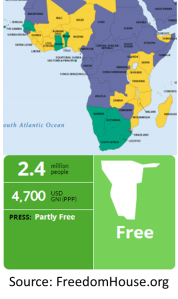When we look at the most recent Freedomhouse.org map of Sub-Saharan Africa, the Southern tip of Africa stands out as consolidated bastion of “Free” states on a continent that is almost entirely dominated by Partly Free and Not Free states. In fact, nowhere else in Africa do two states listed as “Free” share a border. One of these states, Namibia, is very young, achieving independence in 1990. Since then, Namibia has been astonishingly stable, especially given the unrest that many of the states in its neighborhood have experienced. Despite the fact that Namibian politics have been dominated by the South-West Africa People’s Organisation (SWAPO), the former rebel organization that had fought for Namibian independence from South Africa, elections have been considered free and fair. While the press is still somewhat constrained, the state is otherwise characterized by fairly strong democratic institutions. Stability has been maintained despite the ongoing effort for land reforms related to the overwhelming over representation of the white-minority as land owners.
Given the success of this young but stable democracy, two adjectives that rarely accompany one another, Namibia potentially serves as an example of how democracy development should progress. The strong democratic institutions that Namibia enjoys: a bicameral parliament, hybrid presidential/prime-minister executive, and independent courts, were established by a Constitution that was developed immediately prior to Independence. Arguably, the well developed institutions are the key to Namibia’s success. In an article that appeared today in Bloomberg, Joshua Kulantzick argues that the Obama administration, and American administrations in general, have failed to support institution building. He argues that supporting democratic big men and elections alone is insufficient to support democratic transitions in Africa, the Middle-East and elsewhere. Namibia potentially represents a case study to support Kulantzick’s argument. If he is right, this is important given the emphasis that the West has put on democracy development for normative reasons and the more salient security benefit.
As we pursue our objective of spreading democracy (and in the act hopefully creating new allies and perhaps more importantly, new trading partners in the act) it is important to remember two things. First, spreading democracy by force is probably not a good idea. Not only does the use of force to promote democracy carry with it potential normative problems, it also has numerous practical hurdles to overcome. International intervention, even when humanitarian in intent, may not produce the desired results. Second and most important though, is illuminated by a quote from Prime Minister Hage Geingob: “We are not trying to be democratic because we want to please anybody, we have struggled for this democracy.”
In all of our efforts to promote democracy, however we attempt to do that, we must recognize that our economic interests, geo-political interests, and even security interests should not be the driving force for democratization. At the end of the day, this is not about us. Democracy is, as outlined in Abraham Lincoln’s Gettysburg Address, established of the people, by the people, for the people. Whatever support we decide to lend to democratization efforts, it is worth keeping this in mind. Anything else will result in superficial changes and democratic failure.
(This article does contain links to Wikipedia.org. While this is admittedly a less than academic source. It does provide a great resource for basic knowledge though and allows the reader to quickly grasp potentially complex concepts.)


Do you think that it is contradicting that there is this good theory/mechanism for solving issues that has the requirement of creating issues first? Democracies are supposed to be more peaceful than other forms of government but it often generates more conflict before this ultimate stage of DPT is realized. I don’t remember which author wrote this but it was an empirical study that showed that the the US is not really interested in spreading democracy but rather working with any leader that would support its agendas. In this research, the author shows examples of when the US preferred non democratic leaders and removed democratic ones…is there a higher value on who we work with or is democracy still number a primary force for transforming governments?
I enjoyed this post, especially the attention to the positive example of Namibia. I think there should definitely be more attention in the media to the positive examples of African countries and their experiences with democracy. While conflict coverage is truly important and should be prevalent, as it is, more attention to the positive cases by international media sources could serve to have beneficial effects for the continent.
I think that all states look first to their interests, as is right when you consider that a State’s first responsibility is to its own citizens. The catch is to do so, ideally, in a way that also respects the citizens of other states whenever possible. Such is the nature of foreign policy. DPT requires that the states involved be liberal democracies, not simply democracies, so the turn over on investment is a really long timeline. When possible, the US will promote democracy. Where the US feels its security interests are at stake, the US will work with whoever it can. That doesn’t mean that democracy promotion is not a highly valued part of foreign policy, it just means that the US cannot afford to have that be the only piece of its foreign policy. Such is the dilemma facing a superpower.